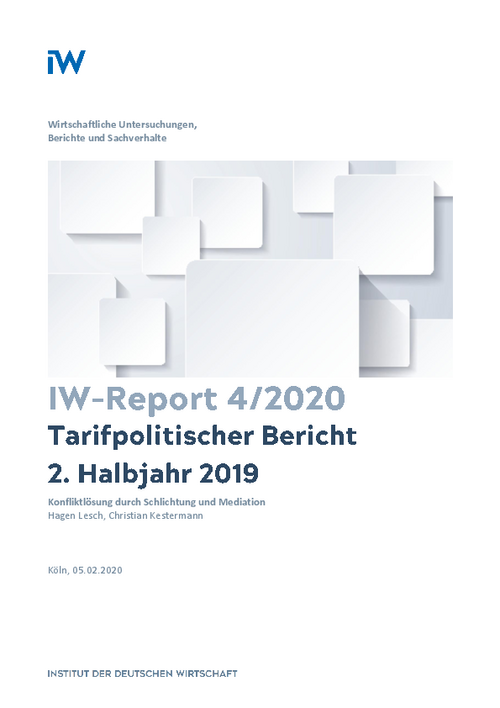In the second half of 2019, collective bargaining was conducted in only five of the 19 sectors included in the German Economic Institut‘s wage monitoring system: In the chemical industry, construction, cleaning services, aviation and hospitals.

Report on Collective Bargaining Policy in Germany, 2nd Half of 2019: Conflict resolution through conciliation and mediation
IW-Report

In the second half of 2019, collective bargaining was conducted in only five of the 19 sectors included in the German Economic Institut‘s wage monitoring system: In the chemical industry, construction, cleaning services, aviation and hospitals.
In addition, in the East German metal and electrical industry, an obligation to explore possible solutions for an East-West adjustment of weekly working hours was fulfilled. Collective bargaining focuses 2019 in the first half of the year. In this half-year, the number of conflicts examined was twenty. An analysis of all conflict events during 2019 shows that the printing industry, banking, cleaning services and aviation were the most conflict-intensive sectors. However, ballots and strikes only occurred in the collective bargaining disputes over cabin crew between UFO and Lufthansa and between UFO and Eurowings. In a long-term comparison, 2019 was more conflict-intensive than the long-term average. The conflict intensity averaged 10.8 points out of 22 analyzed collective bargaining conflicts. For the period from 2005 to 2019, on the other hand, the figure is only 9.5 points. Since 2005 there have been nine years with a lower conflict intensity than in 2019, but only five years with a higher one.

Hagen Lesch / Christian Kestermann: Tarifpolitischer Bericht 2. Halbjahr 2019 – Konfliktlösung durch Schlichtung und Mediation
IW-Report

More on the topic

Forms of Employee Participation and Conflict Management in the Workplace
An analysis based on the IW Personnel Panel showed which topics of conflict emerged in the workplace and how these conflicts were resolved. According to this data from 2022 works councils were present in 11 per cent of all companies.
IW
Works Council Elections 2022: Results of the IW Works Council Election Survey
Works councils receive strong backing from the workforces they represent. Nevertheless, the drop in turnout reported in the IW Works Council Election Survey 2022 suggests that this support is declining.
IW